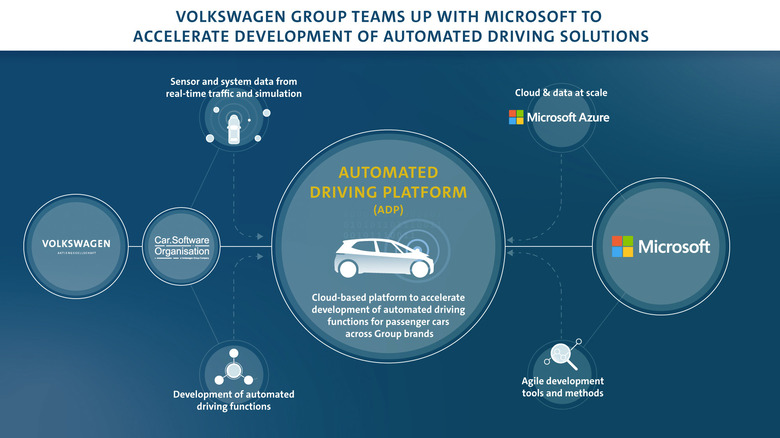VW and Microsoft are building an autonomous car platform with Azure at its heart
Volkswagen and Microsoft are collaborating on autonomous vehicles, with the two behemoths planning to work on an Automated Driving Platform. Announced today, the deal will see the VW Group and Microsoft create a cloud-based system for self-driving vehicles as well as advanced driver assistance systems (ADAS), all tapping Microsoft Azure for compute, AI, and storage.
At the heart of the concept is collaborative learning, treating each individual vehicle as a source of data, and combining that with simulated driving too. "Petabytes of data from road and weather conditions to obstacle detection and driver behavior need to be managed every day for the training, simulation and validation of AD functions," VW says. "Machine learning algorithms that learn from billions of real and simulated miles driven are key to connected driving experiences."
VW Group's Car.Software Organisation, its in-house software company, will work with Microsoft to streamline that process. The goal is a single database, pulling together real traffic data and simulations, which will give autonomous systems and developers a single port of call for road insights. The expectation, VW says, is that the ADP will cut existing development cycles measured in months down to weeks.

It's not the first time Volkswagen has looked to Microsoft's cloud. The Volkswagen Automotive Cloud (VW.AC) – which the automaker uses to deliver data and other mobility services with its vehicles and apps – is already co-developed with Microsoft, though the first VW.AC-enabled vehicles aren't expected to go operational until this year. Even then, they'll only be test cars: production won't be until 2022.
Moving ahead, though, the plan is that ADP and VW.AC will be integrated. It'll mean the ability to not only gather driving data from VW Group vehicles and pass that to the autonomous modeling in the cloud, but also use the connected vehicles to deploy new software via OTA updates to the fleet.
Microsoft, like other big tech names, has been pushing into automotive more aggressively in recent years. Back in January, the company took part in a $2 billion investment round into Cruise AV, General Motors' autonomous vehicle business. That also sees Microsoft become Cruise's preferred cloud provider, with its self-driving vehicles set to use Azure compute and AI for their own processing.
One key area increasingly being seen as relevant for autonomous vehicles and the cloud is edge computing. Effectively distributing compute power, rather than centralizing it, it can act as a filter for broad pipes of data – such as from the multiple sensors on self-driving cars – to minimize the amount of later processing and cut latency.
